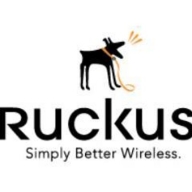

Ruckus Wireless WAN and Ubiquiti Wireless compete in the wireless networking solutions category, catering to businesses of different sizes. Ruckus appears to have the upper hand for larger environments due to its advanced technology features, while Ubiquiti offers a user-friendly and cost-effective solution for smaller enterprises.
Features: Ruckus Wireless WAN is notable for its advanced technologies, including BeamFlex adaptive antenna technology, robust analytics tools, and proactive Wi-Fi security updates, making it suitable for both small and large-scale environments. Ubiquiti Wireless offers user-friendly deployment and management with its cloud-based tools, dual-band Wi-Fi with fast throughput, and seamless roaming capabilities.
Room for Improvement: Ruckus Wireless WAN could benefit from improving delivery times affected by component shortages, providing more intuitive documentation, and enhancing licensing flexibility along with additional analytics features. Ubiquiti Wireless could improve by enhancing enterprise features, strengthening security, and offering more robust technical support.
Ease of Deployment and Customer Service: Ruckus Wireless WAN is respected for straightforward setup but could improve cloud capabilities and documentation. Its customer support is generally well-regarded, though some users report slow response times. Ubiquiti Wireless, with excellent cloud management tools, offers ease of deployment but has less responsive technical support, indicating room for infrastructure improvements.
Pricing and ROI: Ruckus Wireless WAN is considered competitively priced with a positively rated ROI, as the longer lifecycle of its products offsets initial costs. Pricing can vary significantly based on location and requirements. Ubiquiti Wireless is more affordable upfront and significantly cheaper than enterprise rivals, making it ideal for budget-conscious environments where initial costs are crucial, though limited support may affect long-term ROI.
When we seek support, the service we expect is not promptly delivered, which can be time-consuming.
I didn't have any issues with Ubiquiti support.
I find the scalability quite good, with a rating of eight out of ten.
Ubiquiti Wireless offers large scalability, which is very important for our company as we have multiple sites that need to be interconnected and managed effectively.
Ubiquiti Wireless is rated ten out of ten for stability.
There seems to be no visible improvement in the Gartner positioning, which is crucial even as companies like Huawei are also entering the wireless sector.
The firewall configuration also requires significant effort and could be improved for ease of use.
Enterprise users require more details and options.
When I want to deploy a Ubiquiti access point with the centralized appliance, we can't do all the configuration in our lab and send it to the shop.
The price is always on the higher side, which impacts the perception of return on investment.
Ubiquiti Wireless is cheaper.
The equipment is priced relatively high, though the value it provides makes it worth the cost.
The most valuable features are the advanced technologies like BeamFlex, which make a significant difference.
They integrate into the management console very easily, making diagnostics and configuration changes simple.
Since implementing Ubiquiti Wireless, I have seen improvements in connection security, wireless speed, and overall network stability.
Compared to Ruckus, we have not yet seen all benefits for all users and for administration.


Ruckus Wireless’s WAN (Wide Area Network) suite of switches and solutions provides companies and organizations with a wide variety of products that enable them to deploy and manage the kinds of WANs that best meet their needs. Ruckus Wireless is a leader in the field of WAN creation, deployment, and management. Their solutions are designed with the user in mind. They are sleek products and solutions that are easy for administrators to use and maintain. This makes it a valuable suite for any and every kind of industry. The level of ease that it provides makes it possible for companies and organizations to reap a high level of benefit from whichever product they choose to use.
Ruckus Wireless WAN Benefits
Some of the benefits of using the Ruckus Wireless WAN suite of switches and solutions include:
Ruckus Wireless WAN Features
Organizations that choose to use the Ruckus Wireless WAN suite of switches and solutions have a large number of capabilities from which they can choose.
Reviews from Real Users
Ruckus Wireless’s WAN suite is a truly versatile selection of solutions that offer users a complete package of capabilities and features. This suite makes it possible for users to meet all of their networking needs. Their wireless access points are the kind that is mostly employed in industries like resorts, which have to cater to large volumes of people over extended periods of time. They provide companies with the highest possible level of coverage. Users working in any number of fields would find Ruckus Wireless to be up to the task of handling their networking needs. This suite is appropriate for large corporations and small businesses alikes.
An information technology project manager at a university writes, “The actual wireless access points themselves are very powerful. We get very good coverage from just one access point. The throughput is very good and the centralized management is excellent. Also, the ease of deployment is very good.”
A video conferencing administrator at a technology services company states, “The solution is suitable for many types of environments, such as small businesses.”
Ubiquiti Wireless refers to the wireless networking solutions provided by Ubiquiti Networks, a leading technology company specializing in networking and wireless communication products. Ubiquiti Wireless offers a range of innovative and cost-effective wireless networking solutions designed for various applications, including enterprise networks, service providers, small and medium-sized businesses, and home users.
Ubiquiti Wireless products are known for their reliability, performance, and ease of use. They encompass a wide range of devices and technologies, including wireless access points, wireless routers, antennas, bridges, mesh networks, and point-to-point or point-to-multipoint wireless links.
Ubiquiti Wireless Features:
Scalability: Ubiquiti Wireless products are designed to scale easily, allowing organizations to expand their wireless networks as needed without significant infrastructure changes.
Flexibility: Ubiquiti Wireless offers a range of products suitable for various deployment scenarios, including indoor and outdoor environments, long-range connectivity, and mesh networks.
Centralized Management: Ubiquiti provides a centralized management platform called the UniFi Controller, which allows administrators to configure, monitor, and manage their entire wireless network from a single interface.
Seamless Roaming: Ubiquiti Wireless solutions support seamless roaming, allowing wireless devices to maintain connectivity while moving across different access points within a network.
Advanced Security: Ubiquiti incorporates security features such as encryption, authentication, and firewall capabilities to protect wireless networks and data transmissions.
Cost-Effective: Ubiquiti Wireless products are known for their affordability without compromising performance, making them an attractive option for organizations with budget constraints.
Community Support: Ubiquiti has a vibrant community of users and enthusiasts who actively contribute to knowledge sharing, troubleshooting, and expanding the capabilities of Ubiquiti Wireless products.
Ubiquiti Wireless Components:
Ubiquiti Wireless encompasses a range of components that work together to provide reliable and scalable wireless networking solutions. Here are some key components commonly found in Ubiquiti Wireless deployments:
Reviews from Real Users
George Ferns, Solution Architect - Networking and IoT at a wholesaler & distributor, states that Ubiquiti Wireless has "Attractive pricing and good for home use and small businesses, but it is not easily scalable and lacks security features".
Walter Shelver, Owner at CableWeb, writes that "The most valuable aspect of Ubiquiti is the ease of setup. It's easy to set up, secure, and use. It works on an adoption basis. I can pull the system up, design a network, and pull 20 different Ubiquiti units into it".
ThomasWilke, CEO at CITOM, says that “You can almost do everything with Cisco products for a much better price with a significantly lower learning curve”.
We monitor all Wireless WAN reviews to prevent fraudulent reviews and keep review quality high. We do not post reviews by company employees or direct competitors. We validate each review for authenticity via cross-reference with LinkedIn, and personal follow-up with the reviewer when necessary.